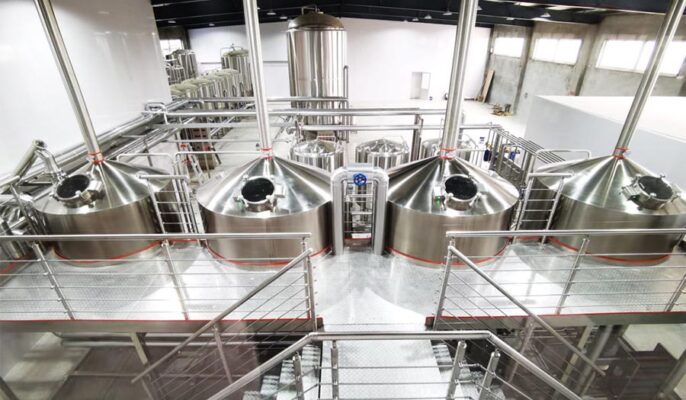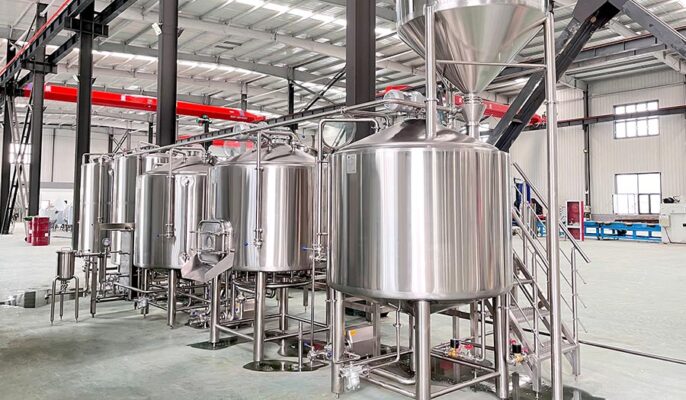If you have decided to start a brewery and are starting to think about purchasing the necessary equipment. The process of implementing a turnkey brewery system is complex. First determining your production capabilities and then selecting the right storage tanks to complement your brewery and controls are critical to our turnkey systems.
What is a turnkey brewery?
Turnkey breweries are equipped breweries that are ready for production immediately upon buy. This means buyers don’t have to go through the hassle of setting up every device or process from scratch. One of the main advantages of a turnkey solution is that it is quick and easy to set up.
The following are the main components of a turnkey brewery:
- Brewing System: This is where the actual beer brewing process begins. A complete system may include a mash tun, brew kettle and hot liquor tank.
- Fermenters: These are crucial to the fermentation process in which wort is converted into beer.
- Cooling system: Keeping beer at the proper temperature is critical to its quality and taste.
- Packaging line: After the beer is brewed, it needs to be packaged. This may include canning, bottling or kegging systems.

Heating system
For a brewery, whether electric, steam or direct fire heating is best depends on a few factors. When deciding on a heat source. The size of the brewery, available utilities, and initial and ongoing costs all need to be considered.
Electric heating
- Electric heating efficiency is close to 100%. Since the heating element is immersed in the distilled water or wort, all thermal energy is transferred to the liquid and is not lost in heating the brewery.
- Electric heating design is compact and flexible, ideal for small spaces
- Low equipment and installation costs
- Precise control to achieve high repeatability and automation
Steam heating
Steam systems are used in brewing systems of all sizes. We offer turnkey steam breweries up to 30 barrels with varying degrees of automation.
- The preferred heat source for large breweries
- Flexible design for tank placement
- Higher efficiency (compared to direct fire heating)
- Larger heating surface area than direct combustion system
- Higher level of automation and repeatability than direct fired systems
- Ideal for spaces with limited power
Direct heating
Many breweries want a more traditional heat source, and direct-fired (up to 10 BBL) and indirect-fired (up to 15 BBL) systems are good options. Ideal for situations where electricity or steam needs are unavailable, and because no boiler is required, the upfront equipment and installation costs are lower compared to steam.
- The best choice for small beer brewing systems
- cheap price
How much does a turnkey brewery cost?
The cost of a turnkey brewery can vary depending on a variety of factors including capacity, brand, location, and included features. Here’s a closer look at the complexities of turnkey brewery pricing.
The capacity of the brewery, different brands and transportation, different installation locations, etc. may incur more costs.
The following cost ranges can be roughly listed based on capacity:
| Capacity (barrel) | Price range |
| 3-5 | $20,000-$60,000 |
| 7-10 | $60,000-$100,000 |
| 15-20 | $100,000-$150,000 |
Also to the initial investment, potential brewery owners should also consider operating costs such as raw materials (malt, hops, yeast), utilities, licenses, and personnel wages.
What types of turnkey breweries are there?
Nanobrewery
The smallest commercial brewery, usually less than 3 barrels in capacity. Perfect for enthusiasts turning their hobby into a business or small pubs wanting to produce their own signature beers.
Microbrewery
Small breweries range from 3 barrels to 15 barrels. They work best for local distribution, and some even have their own bars.
Craft brewery
larger than a small brewery, capacity ranges from 15 to 60 barrels. They often specialize in unique craft beers and have a wider distribution network.
Commercial brewery
These are the giants of the beer world, with a capacity of over 60 barrels. They cater to a wide range of markets and have extensive distribution channels, sometimes even.

How to choose a turnkey brewery?
Choosing the right turnkey brewery is a critical decision.
- Determine Brewery Size: Before entering the market, know how big you want your operation to be. Whether it’s nano, micro, process or industrial settings, your choice should align with your business goals and projected growth.
- Consider the budget: Budget amount limits play an important role. Establish a clear budget early on. But don’t look at the initial cost. Consider operating costs, scalability potential, and the longevity of the equipment.
- Supplier Reputation: Choosing a reputable supplier is crucial. Find reviews, testimonials and case studies. Reputable suppliers not only guarantee the quality of their equipment, but often provide better after-sales support.
- Training and Support: After-sales training and support can make or break your brewing experience. Make sure the supplier provides comprehensive training and has a responsive support team.
- Warranty and Service: Beer equipment happens to wear and tear, and a strong warranty can help avoid unexpected costs.
Asked Questions
What is a turnkey brewery?
A turnkey brewery is a complete brewing solution that allows the brewery to start production immediately after setup. It includes everything from brew kettles and fermenters to bottling lines, all pre-configured and ready to run.
How to ensure the authenticity of Chinese beer suppliers?
Always conduct thorough research, seek advice from industry peers, check reviews, and most , communicate with the supplier. If possible, a tour of the manufacturing facility can also provide clarity.
Can Chinese brewery equipment be customized to meet my specific requirements?
Yes, many top Chinese manufacturers, including Micet Group, emphasize custom design projects, ensuring equipment is tailor-made to meet individual brewery specifications and needs.
How do I maintain and clean my turnkey brewery equipment?
Regular cleaning and maintenance are critical to the longevity and efficiency of your brewing equipment. Most manufacturers provide detailed manuals and guides. Additionally, after-sales support and training courses are beneficial.





you are in reality a just right webmaster The site loading velocity is incredible It seems that you are doing any unique trick In addition The contents are masterwork you have performed a wonderful task on this topic